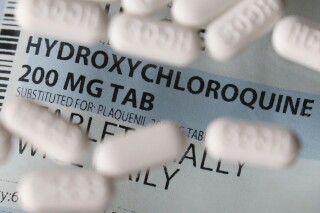Posts mislead on Mayo Clinic’s hydroxychloroquine webpage

This Monday, April 6, 2020 file photo shows an arrangement of hydroxychloroquine tablets in Las Vegas. In September 2023, social media users misrepresented outdated language on the Mayo Clinic’s webpage on hydroxychloroquine, falsely suggesting it was recently updated to admit that the drug is an effective treatment for COVID-19. (AP Photo/John Locher)
CLAIM: The Mayo Clinic “quietly” updated its website in 2023 to say that hydroxychloroquine can now be used to treat COVID-19.
AP’S ASSESSMENT: False. A page about hydroxychloroquine on the hospital system’s website included outdated guidance that the malaria drug “may also be used to treat coronavirus (COVID-19) in certain hospitalized patients.” But archives show the text has been there since at least May 2020, a month before the U.S. Food and Drug Administration revoked its emergency approval for using the drug to treat COVID. After the Mayo Clinic page circulated widely in recent days, the organization took the page down and clarified that it does not endorse the use of hydroxychloroquine for treating COVID-19 patients.
THE FACTS: Anti-vaccine advocates have long touted the malaria drug as an effective treatment for COVID-19, even though health officials and experts say that’s not the case.
In recent days, many social media users have been pointing to the outdated language on the Mayo Clinic’s informational page for hydroxychloroquine, falsely suggesting it was recently updated to admit that the drug should be used to treat coronavirus after all.
“JUST IN: Mayo Clinic QUIETLY ADMITS on its website that hydroxychloroquine can be used to treat COVID 19..” reads one post on X, the platform formerly known as Twitter, which had more than 24,000 likes as of Wednesday.
A screenshot in the post shows that that page read, in part: “Hydroxychloroquine may also be used to treat coronavirus (COVID-19) in certain hospitalized patients.”
However, archived versions of the website show there was nothing new about the language and it had been there since at least May 2020. In June 2020, a line was added lower down on the page, which is cut out of the screenshot, saying that the drug should only be used in clinical trials.
Hydroxychloroquine had been granted emergency use authorization for COVID-19 in March 2020. The anti-malaria drug was authorized to be used for certain hospitalized COVID-19 patients, but the FDA revoked that authorization in June 2020, saying emerging data suggested it was “unlikely to be effective in treating COVID-19 for the authorized uses in the EUA.”
In a statement on Monday, the Mayo Clinic said the organization was aware of the “inaccurate information” on its website, which it said had come from an outside vendor.
The clinic clarified that the drug is not part of its prescribed treatment for COVID-19 and that it does not endorse using it to treat COVID patients.
The Mayo Clinic has now removed the hydroxychloroquine page, and the URL redirects to another page stating explicitly that it is not recommended as a treatment for COVID-19
Medical experts told the AP that the information on the page was consistent with the FDA’s guidance at the time it was written, but it has been clear since early 2020 that hydroxychloroquine treatments were not likely to help COVID-19 patients.
“That Mayo clinic page looks like standard early-COVID medical advice, from before there were any clinically approved antivirals available. Those were desperate times,” Benjamin Neuman, chief virologist at Texas A&M University’s Global Health Research Complex, wrote in an email. “This is interesting as a historical relic, and would not be considered sound medical advice by current standards.”
Neuman cited multiple studies published in 2020 and 2021, including one from Brazil, that showed the drug had no effect on COVID-19 patients. He said he wasn’t aware of any clinical trials of hydroxychloroquine that were still ongoing in the U.S.
Brian Garibaldi, the director of the Johns Hopkins Special Pathogens Center and Biocontainment Unit, concurred that hydroxychloroquine should not be used as any treatment strategy for COVID, and no new research or guidance suggests otherwise.
“There is nothing new in the world of COVID and hydroxychloroquine,” said Garibaldi.
___
This is part of AP’s effort to address widely shared misinformation, including work with outside companies and organizations to add factual context to misleading content that is circulating online. Learn more about fact-checking at AP.


